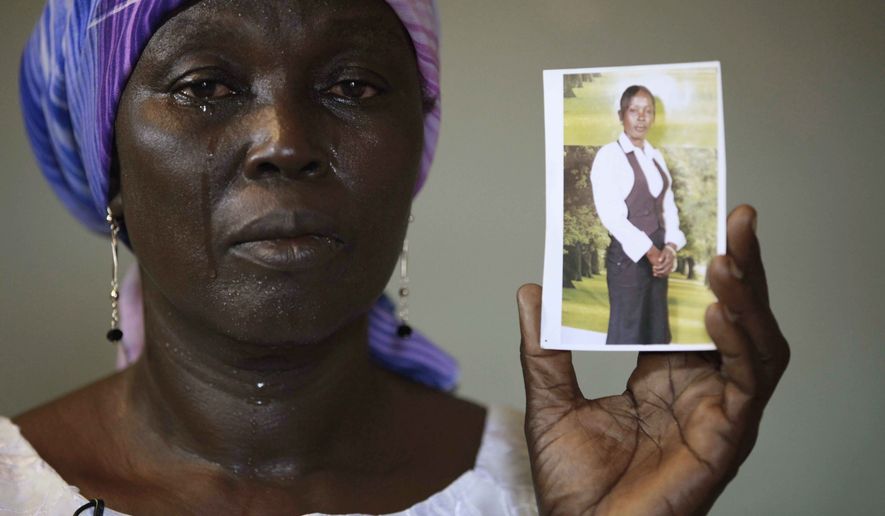The capture of nearly 300 schoolgirls in northern Nigeria by terrorist group Boko Haram energized the international community this year, spawning an international awareness campaign that generated about 4 million tweets, including one from first lady Michelle Obama.
More than 200 days later, #BringBackOurGirls is all but forgotten, the girls have faded from public attention, and most have likely been married off — though advocates are still working to secure their release and reunite them with their families.
Some of the girls have escaped, but 219 remain in captivity, said Rona Peligal, Africa deputy director at Human Rights Watch.
“We believe they have been married off and they are living in a dispersed fashion probably somewhere in the forest in northeast of Nigeria,” she said.
The girls were kidnapped just before midnight April 14 when members of Boko Haram broke into the Government Secondary School in Chibok. Some of the attackers were wearing military uniforms and claimed to be at the school to provide protection from an imminent assault, so they had no trouble persuading the girls to leave with them, according to the Bring Back Our Girls website.
The number of girls kidnapped is uncertain because students from neighboring schools were in Chibok temporarily to take their exams, so there is no accurate record of who was at the school that night, the Bring Back Our Girls site said.
SEE ALSO: Boko Haram kills 33, abducts 200 from Nigerian village
The girls who remain in captivity are likely facing forced labor, sexual assault and even being used in military operations by luring men into ambushes, according to a Human Rights Watch report from October that interviewed other girls who have been kidnapped by Boko Haram and escaped, including several from the school incident.
Since the large group of schoolgirls went missing, Boko Haram has engaged in several smaller-scale kidnappings, said Tim Longman, director of the African Studies Center at Boston University.
Girls who have escaped describe horrific experiences, including being beaten and threatened with death for refusing to convert to Islam. Other girls were forced into marriages with Boko Haram fighters, including a 17-year-old who objected that she was too young. According to Human Rights Watch, which interviewed her, her captor pointed at his 5-year-old daughter and said she was married the previous year and was waiting for puberty for the marriage to be consummated.
The Nigerian government has asked the U.S. to send military help to rescue the girls, but because of restrictions on supporting militaries that have committed human rights abuses, Ms. Peligal said, American officials haven’t committed any troops but instead have provided help on strategy.
The Nigerian military has made progress retaking some towns held by Boko Haram, but Mr. Longman said it has not made great gains. While Nigerians are pursuing a more aggressive military option next year, Mr. Longman said, it may not be effective because Boko Haram members could slip across the border to Cameroon.
“Frankly, there is no easy answer,” he said. “The group is growing out of some justified discontent that people have, but it is not a particularly reasonable group so it’s not easy to negotiate with them and it’s not easy to meet their demands.”
The Washington-based communications group Levick, which is representing the Nigerian government, declined to comment on efforts to secure the girls’ release.
“Given the sensitivity of effort to obtain release of the girls and related issues to the government’s efforts to defeat the terrorist organization, Boko Haram, we cannot comment any further,” the group said in a statement.
The State Department said U.S. officials have been part of an advisory team in Abuja, Nigeria, and have dedicated some staff at the embassy in the capital to provide assistance.
“We have helped establish a program to provide care, counseling and education to victims of Boko Haram,” a State Department official said. “We are also working with Nigerian authorities to provide assistance with humanitarian programs, intelligence and strategic communications.”
With few options, Human Rights Watch said, it will ask for investigations by an independent commission into Boko Haram and Nigerian security forces and ask the United Nations to organize other local countries to mount a rescue mission.
“It’s a regional problem that needs a regional solution,” Ms. Peligal said.
She said a priority is to ensure that the girls who have escaped have access to medical care and psychological counseling. Human Rights Watch says the Nigerian government has failed to meet these needs.
Ms. Peligal also said it’s OK that the kidnappings are no longer front-page news.
“This had its 15 minutes or something of fame, but getting attention to things by itself doesn’t solve things. It helps but it doesn’t solve things,” she said.
• Jacqueline Klimas can be reached at jklimas@washingtontimes.com.




Please read our comment policy before commenting.